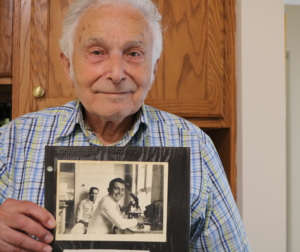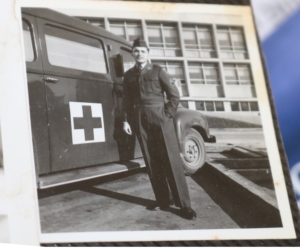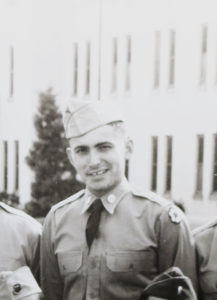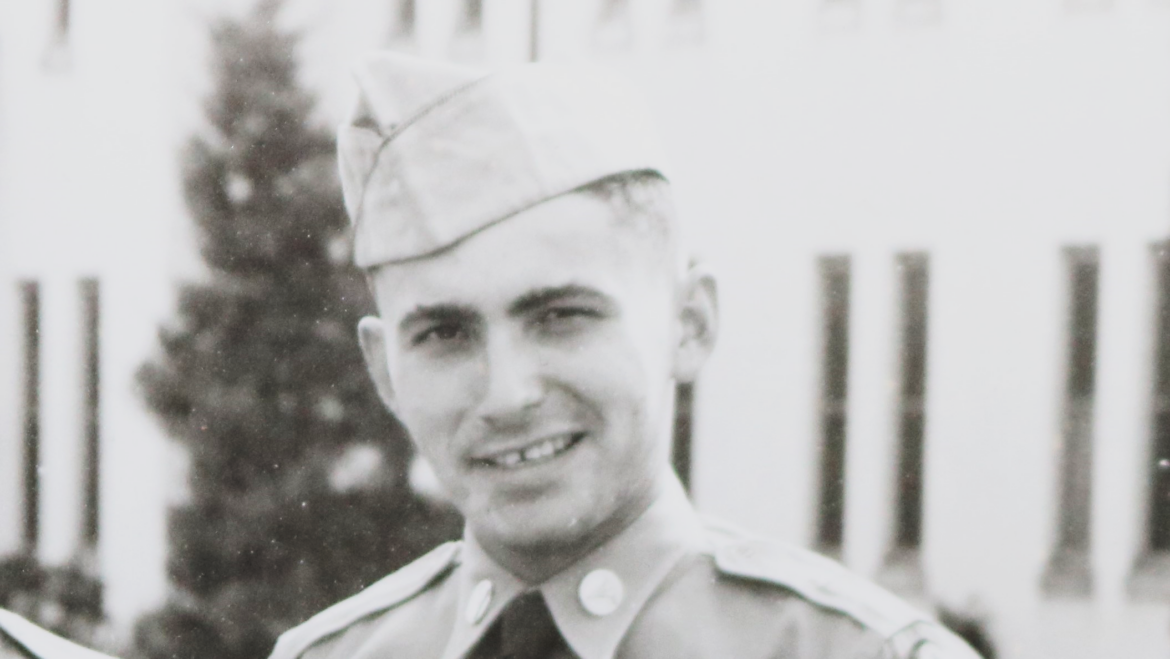 In honor of Veterans Day we sat down with Korean War veteran and Stein Assisted Living resident, Joseph “Mel” Rimmer, along with his wife Ethel, to learn how being a veteran has shaped his life.
In honor of Veterans Day we sat down with Korean War veteran and Stein Assisted Living resident, Joseph “Mel” Rimmer, along with his wife Ethel, to learn how being a veteran has shaped his life.
Born in the Bronx, New York in 1930, Mel Rimmer was a hard worker all his life. At the early age of eight years old, Mel began selling pins and buttons outside of Yankees Stadium for extra cash. “I still remember my first game. I made 85 cents that day. That was big stuff!” Mel reminisced. He and Ethel recalled what it was like growing up at the time. It was not uncommon for the young people in their neighborhood to take on jobs working at school or on the street – bringing home extra money and helping their families along the way. As Mel got older and attended high school, he enjoyed singing in the school choir and playing the trumpet; a hobby he carried with him throughout his service in the military.
Mel Rimmer served in the United States Army from 1951-1954. He enlisted on his own accord to gain a better chance at choosing an area of his liking. “My older brother was drafted and sent to Japan as an infantryman. After that happened and many of my friends began to join different branches, I decided to look into joining the Army. Everyone was going so it felt pretty normal,” he said. Mel joined the Army Medical Corps and was sent to Fort Sam Houston in San Antonio, Texas to train as a laboratory technician. Upon completing his training, he left the United States and was stationed in Germany where he used his skills to help other US soldiers.
“One of the duties I remember from Germany was going on what they called an ‘alert,’” Mel said. “We went out on alerts whenever there was fear of an ambush from the Russians. I drove an ambulance out with a large infantry unit, and we all camped out. They’d come to me whenever they needed help. I was lucky because I got to sleep in the ambulance.” As a laboratory technician in the 24th Dispensary, Mel aided the Army in other ways such as testing the potability of water, beer and other beverages being brought in for fellow soldiers.
Mel’s wife Ethel also recalled what life was like at home during the war. Propaganda and fear were very much instilled in the minds of many US citizens. Ethel credits her habits of reading and listening to the radio as the things that kept her levelheaded and informed – even as many of her friends lost their lives to the war.
When the time finally came to return home, Mel’s family had moved to a chicken farm in South Brunswick, NJ. When asked how it felt to come home, Mel laughed, “I remember the first night I came back; I was so happy. I could stay in bed as long as I wanted. I didn’t have to get up! That was so exciting. And then we went on to get jobs, go to school again… it was all exciting.” Upon his return home, Mel immediately began searching for work. He drove to every factory and laboratory in the area but struggled to find work as quickly as he had hoped. During that time, he married his wife Ethel.
 Eventually, Mel found a job and began taking evening classes at Rutgers University-New Brunswick, where he obtained his Bachelor’s and Master’s degrees under the GI Bill. He also received a doctorate in Counseling Psychology from Columbia Pacific University. Mel credits his education and following career as a result of his service in the Army, “For me, it was one of the biggest experiences of my life. I got training that enabled me to move ahead and learn a profession. It was all positive. Basic training was tough but besides that it was a good experience.” Mel went on to work the field of social work for many years — helping children and families in New Jersey along the way.
Eventually, Mel found a job and began taking evening classes at Rutgers University-New Brunswick, where he obtained his Bachelor’s and Master’s degrees under the GI Bill. He also received a doctorate in Counseling Psychology from Columbia Pacific University. Mel credits his education and following career as a result of his service in the Army, “For me, it was one of the biggest experiences of my life. I got training that enabled me to move ahead and learn a profession. It was all positive. Basic training was tough but besides that it was a good experience.” Mel went on to work the field of social work for many years — helping children and families in New Jersey along the way.
As a final take away, Mel had this to say, “As far as the Army and service, I would be hesitant to go back in general. I wouldn’t take back the experience but I’m not really an advocate for war. A lot of people who came to see us in the Medical Corps had not only physical pain, but some mental and emotional problems. Serving definitely gave me a different level of concern for people and animals.”
No matter one’s opinion on war or the military in general, one thing holds true; the troops who put their lives on the line both in the past and today are heroes. The Wilf Campus would like to thank Mel Rimmer and all veterans for their service.

